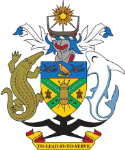The Land Reform Unit offers advice and consultation with regards to any land reform matters within the Solomon Islands. The Unit is also responsible for implementing Government Policy on customary land reform programs.
Central Land Record Office
A Central Land Record Office (CLRO) is proposed to be established to implement the Customary Land Records Act until such time as a customary land reform process has been endorsed by the Solomon Islands Government. The CLRO will be responsible for the recording of customary land in Solomon Islands in accordance with the Customary Land Records Act, and for administering this Act in general. The CLRO will work towards achieving the ultimate goal of recording all customary land in Solomon Islands. In particular, the CLRO will be responsible for the following tasks:
Customary Land Record Areas (“declared areas”):
- Seek recommendations from Provincial Executives in relation to the declaration of Customary Land Record Areas (i.e. “declared areas”) in each respective province;
- Encourage Provincial Executives to seek the declaration of all parts of each respective province where there is strong interest in principle to record and register customary land ownership;
- Seek approval from the Minister for Lands in relation to the declaration of Customary Land Record Areas;
Applications for land recording:
- Proactively seek interest from land holding groups across Solomon Islands to have their land recorded in accordance with the Act;
- Receive applications via the Provincial Land Record Offices from customary land holding groups or any other person who claims an interest in any customary land for the recording of such primary rights and the demarcation of the extent of the boundaries of such customary land;
- publish notices in relation to applications to record customary land and containing all information required under the Act;
Confirming boundaries and landowning groups:
- Meet customary land holding groups on their land and walk the boundaries of the land that is subject to an application for recording;
- Organise, by agreement with the Surveyor General, the mobilisation of surveyors to accompany recording officers to record the boundaries and interests of groups claiming primary and secondary rights to customary land;
- Record names of customary land holding groups claiming customary land ownership, the genealogy of the group and thereby the basis of membership of the group, the methods by which membership of the group may be granted, and the names of person(s) who are said to represent the group and give effect to any land dealing;
- Record names of groups claiming secondary rights to land, and the extent of those rights;
- Organise with the Surveyor General the preparation of record maps to which claims relate;
- Facilitate discussions between claimants in the event of a dispute arising in relation to boundaries or names of claimants for primary rights to customary land, and be present at any ceremony to witness the resolution of the dispute to record the agreed details;
- Refer unresolved disputes to the traditional chiefs to resolve;
- Issue and publicise completion notices to enable interested parties to view the record and make representations in the case of any apparent errors or omissions in the record;
- Consider any representations made in relation to a publicised record, and make amendments as necessary and finalise the record;
Maintain records:
- Arrange, secure, preserve and publicise as necessary copies of all customary land records in accordance with the Act, including maps, supporting evidence, and a Presentation Book;
- Include the details of any customary land ownership determined by the High Court or Court of Appeal in the records of the Central Land Record Office;
- In consultation with the Surveyor General, facilitate the keeping of customary land maps;
- In consultation with the Registrar of Titles, facilitate any application made by a recorded customary land holding group to have the group’s rights registered under the Land and Titles Act.
In general:
- Manage the CLRO;
- Liaise with the Provincial Land Record Offices established by the respective Provincial Executives.

